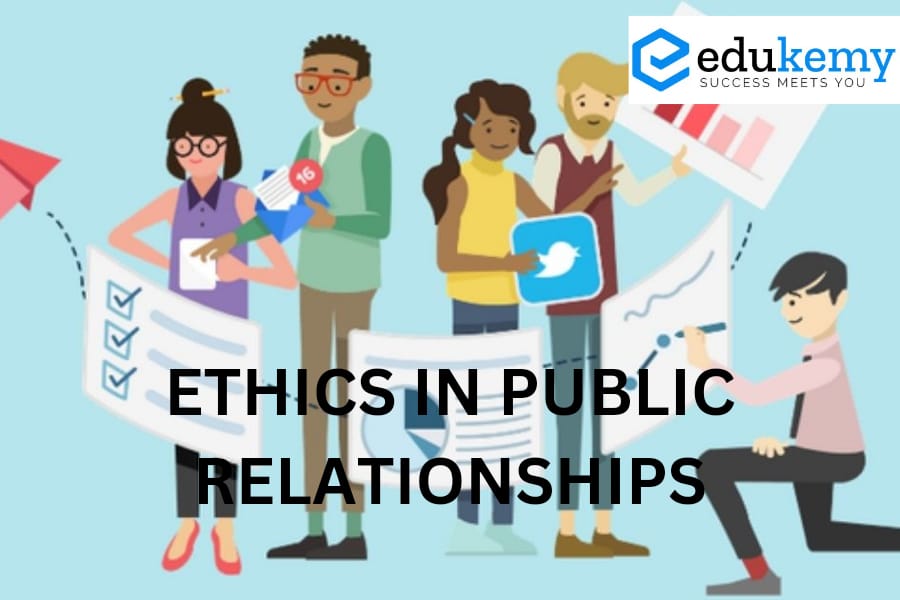
Ethics in public relationships is a vital aspect of any society, governing how individuals, organizations, and institutions interact and communicate with the public. These ethics encompass principles and standards that guide behavior, ensuring honesty, transparency, and responsibility in all public engagements.
Introduction to this field involves exploring various dimensions, including:
Contents
- 0.1 Trust and Integrity:
- 0.2 Transparency and Disclosure:
- 0.3 Fairness and Justice:
- 0.4 Responsibility and Accountability:
- 0.5 Respect for Privacy and Confidentiality:
- 0.6 Social Responsibility:
- 0.7 Continuous Learning and Improvement:
- 1 FAQs
- 1.0.1 Q: What are the consequences of unethical behavior in public relationships?
- 1.0.2 Q: How can organizations ensure ethical conduct in their public relationships?
- 1.0.3 Q: What role does transparency play in ethical public relationships?
- 1.0.4 Q: How can public relations professionals balance competing interests ethically?
- 1.0.5 Q: What are some ethical challenges specific to digital public relations?
- 1.1 In case you still have your doubts, contact us on 9811333901.
Trust and Integrity:
Public relationships thrive on trust. Ethical conduct builds and maintains trust between organizations, individuals, and the public. Integrity is crucial in upholding ethical standards, ensuring consistency between words and actions.
Transparency and Disclosure:
Open communication and transparency foster credibility and accountability. Ethical practitioners disclose relevant information honestly, even when it may be uncomfortable or detrimental to their interests.
Fairness and Justice:
Ethical public relationships uphold fairness and justice, treating all stakeholders with respect and dignity. This involves considering the diverse needs and perspectives of different groups and striving for equitable outcomes.
Responsibility and Accountability:
Ethical practitioners recognize their responsibility to the public, acknowledging the potential impact of their actions on society. They hold themselves accountable for their decisions and their consequences.
Respect for Privacy and Confidentiality:
Respecting the privacy and confidentiality of individuals and organizations is paramount in ethical public relationships. Practitioners must handle sensitive information with care and ensure that it is not misused or disclosed without consent.
Social Responsibility:
Ethical public relationships extend beyond individual transactions to consider broader societal impacts. Practitioners should actively contribute to the well-being of society and minimize harm to the public and the environment.
Continuous Learning and Improvement:
Ethical public relations professionals engage in ongoing learning and self-reflection to enhance their ethical decision-making skills. They adapt to evolving societal norms and ethical standards, striving for continuous improvement.
FAQs
Q: What are the consequences of unethical behavior in public relationships?
Unethical behavior can lead to a loss of trust and credibility, damaging relationships with stakeholders and the public. It can result in reputational harm, legal repercussions, and financial losses for organizations. Additionally, unethical conduct may erode employee morale and contribute to a negative organizational culture.
Q: How can organizations ensure ethical conduct in their public relationships?
Organizations can promote ethical conduct by establishing clear ethical guidelines and codes of conduct for employees. They should prioritize transparency, accountability, and integrity in all interactions with stakeholders. Training programs and ongoing education can help employees understand ethical principles and apply them in their work. Regular monitoring and evaluation processes can also help identify and address potential ethical issues proactively.
Q: What role does transparency play in ethical public relationships?
Transparency is essential for building trust and credibility with stakeholders. It involves openly sharing information about organizational activities, decisions, and performance. Transparent communication helps stakeholders make informed decisions and holds organizations accountable for their actions. By demonstrating transparency, organizations can foster trust and strengthen their relationships with the public.
Q: How can public relations professionals balance competing interests ethically?
Public relations professionals must navigate competing interests, such as those of their organization, clients, and the public, while upholding ethical principles. They can achieve this by prioritizing honesty, integrity, and the public interest in their decision-making. Seeking consensus among stakeholders, disclosing conflicts of interest, and considering the potential impacts of their actions on all parties involved can help professionals navigate ethical dilemmas effectively.
Q: What are some ethical challenges specific to digital public relations?
Digital public relations present unique ethical challenges, such as managing online reputation, data privacy, and the spread of misinformation. Professionals must ensure transparency and authenticity in online communications, safeguarding the privacy of individuals’ personal data. They should also strive to combat misinformation and disinformation responsibly, promoting accurate and truthful information online. Additionally, ethical digital public relations involve respecting digital boundaries and avoiding intrusive or manipulative tactics in online interactions.
In case you still have your doubts, contact us on 9811333901.
For UPSC Prelims Resources, Click here
For Daily Updates and Study Material:
Join our Telegram Channel – Edukemy for IAS
- 1. Learn through Videos – here
- 2. Be Exam Ready by Practicing Daily MCQs – here
- 3. Daily Newsletter – Get all your Current Affairs Covered – here
- 4. Mains Answer Writing Practice – here

